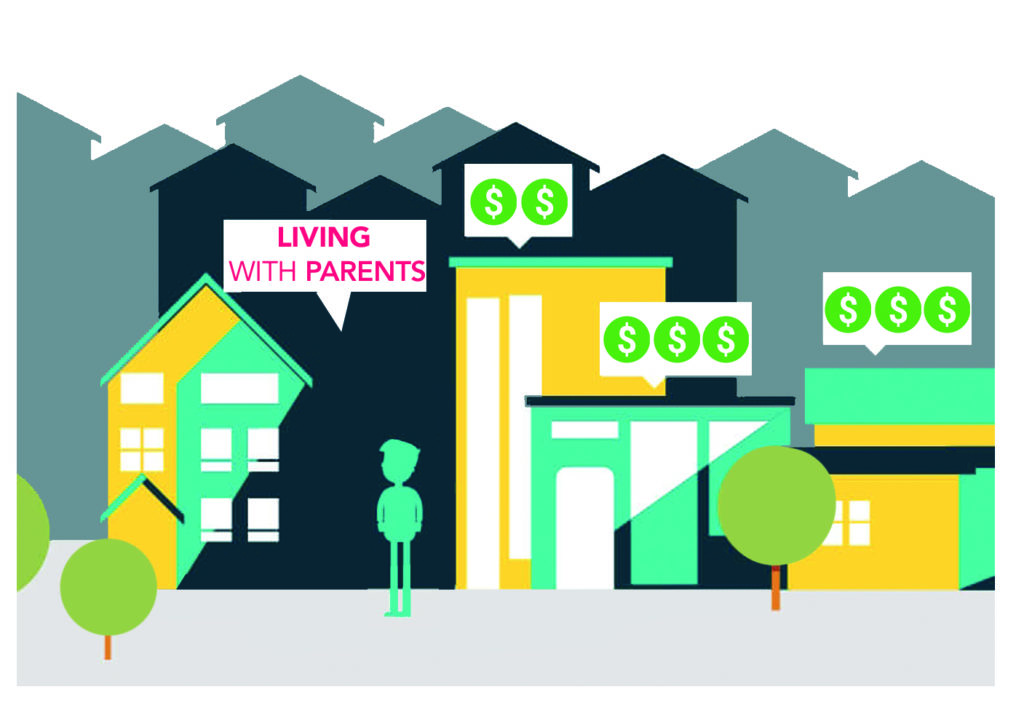Why do millennials in Miami live longer with their parents?
By: Diana Bello Aristizábal
DORAL, FL – In the 80s, young adults left their parents’ home to live on their own at 24 years old. Today, according to a study of Zillow, a website that lists real estates for rental and purchase, the millennial generation leaves home at age 29. This new finding places Miami as one of the cities in the country where young people leave later from the paternal home, along with Los Angeles and New York.
According to the firm, this reality has a lot to do with changes in social and cultural norms, a rising in pricing to rent and buy, low wages and the high cost of living, among other things.
But what other reasons drive millennials to live with their parents for a long time? How much it costs to rent or buy a home in Miami today? What ideals of living do millennials have? And what is key for a healthy coexistence between them (children) and the previous generation (parents) that differ so much in their points of view?
These and other questions have brought our attention in the face of this matter that sheds light on the generational changes, the reality of the real estate market, and the new challenges that parents of this generation must face.
A philosophical, cultural and economic issue
Generally speaking, millennials are those between 20 and 37 years old, meaning people born between 1981 and 2000. This group differs greatly from previous generations such as the X and the Baby boomers who were too focused on their jobs, wanted to have a comfortable life, and retire with enough money to start enjoying and traveling after 60.
“Millennials want to live in the present moment, travel and enjoy work but not to live only for that. They are idealists, no longer want to get married, as much as young people of other times did, and are not so interested in money, ”says Christina Balinotti, doctor in psychology and expert on family issues.
These characteristics, in addition to the increasing cost of living, often leads them to postpone their parental home exit time because they do not want to live subject to a mortgage or rent, economically limited, or sacrifice their personal projects.
This is the case of Glenda Correa, a Colombian-Mexican immigrant born in Miami and mom of a 21-year-old with whom she plans to live until he finishes his second career and is able to start a life away from home.
“He made the decision to stay with us although he could get a job, leave school and make a life on his own, but he wants to save money and finish school without rushing to live alone, ”says this mother who is happy to have him at home, because even though he is not independent, he studies hard, works part-time, pays some bills and is a volunteer.
 For Beth Lorraine Story, an American woman and mom of a 28-year-old who recently moved from home, millennials in Miami live longer with their parents due to a cultural factor.
For Beth Lorraine Story, an American woman and mom of a 28-year-old who recently moved from home, millennials in Miami live longer with their parents due to a cultural factor.
“Miami is very expensive, but even if it wasn’t, I think children would continue staying at home longer because that is the way people live in Latin countries. For me it’s weird, and I don’t know how they do it, I never learned to live with my adult son,” says Beth.
Dr. Balinotti agrees with her. For the expert, many Hispanic parents live with their adult children, even when they are way older, because in that way they don’t feel the empty nest syndrome.
In Beth’s case, her eldest son lived for some time with her, her husband and her other children while his career as a disc jockey and business in the record industry took off, and in order to save money to start on his own.
He did it motivated by his dream of working in the music industry, although he constantly argued with his mother, refused to abide by her rules, and lived in a family room due to lack of space.
“He went to college in Tallahassee, but returned to Miami at 26 years old, due to the lack of means to live alone. His plan was to stay only for two months but ended up staying for a year because he wanted to live in a city like Miami Beach where rent is higher, so he had to save more money,” says Beth.
According to Beth, for her son, it was more important to make it as a disc jockey and live the lifestyle he wanted than leaving home as soon as possible. Many times her mother advised him to get a regular job to earn more money, but he never did.
But in addition to the cultural and philosophical factors, the economic one that forces many millennials to stay at home cannot be denied. This is the case of Jessica García, 31, and mother of three children.
 “My husband, children, and I live in my parents’ home for economic reasons, because we cannot afford to rent in Miami. We would need a unit with at least three rooms, and my wage could not cover that,” says Jessica.
“My husband, children, and I live in my parents’ home for economic reasons, because we cannot afford to rent in Miami. We would need a unit with at least three rooms, and my wage could not cover that,” says Jessica.
Renting or buying a home in Miami can involve a significant investment of money, which is why many millennials sometimes leave home later than other past generations.
“Currently, they become first-time buyers between 30 and 35, while other generations did so at age 25,” says Mario Ávalos, a real estate agent who has been in the industry for 20 years.
But not everyone buys. According to the expert, since oftentimes, prices don’t match the type of property on sale (ex: high pricing for a small apartment), many young adults are not willing to make that kind of commitment and instead prefer to rent.
“In Miami, buyers not only compete with locals, but with foreigners or people from other states that are looking for a second home to hide from winter or to be away from a difficult situation in their home countries. This reality has increased prices in some high demand areas such as Brickell, ”says Mario.
This situation has gotten to a point where a lot of millennials buying for the first time need financial help from their parents. “Approximately 8 out of 10 receive some kind of help from their parents for the downpayment or closing costs. This is due to the little saving culture that this generation has, ” adds Mario.
So, what expenses do first-time-buyers need to consider to move out? According to the expert, a home below $300,000 will require to have a minimum of 8 percent of the total cost, which covers the downpayment and closing costs. Buying a property of a higher price implies having between 9 and 20 percent of the total value.
The average prices for rent in Miami are between $1,700 and $2,300 depending on location and size, and for buying, between $300,000 and $350,000. “Homes below that range, often need arrangements that increase costs,” warns Mario.
My house, my rules
Given this scenario and the great differences there are between the millennial generation and its predecessors, is it a good idea for them to live along with their parents? Glenda Correa says yes as long as they comply with rules.
“My son works and is a responsible person; that’s why I support him. However, I would never allow him to live with me if he didn’t work or help in any way at home because I would be sending him the wrong message,” thinks Glenda.
“Parents need to set some rules at home from the beginning,” says Dr. Balinotti, for whom millennials should always make a financial contribution when living with their parents or, if not possible, at least help with chores such as cleaning or cooking.
 Jessica García agrees with this mentality. In exchange for her parent’s generosity, she pays all household bills, such as electricity, water, and Internet, buys her own food and do house chores. “At home, we are a team, and we all do something.”
Jessica García agrees with this mentality. In exchange for her parent’s generosity, she pays all household bills, such as electricity, water, and Internet, buys her own food and do house chores. “At home, we are a team, and we all do something.”
Beth Story, on the other hand, regrets not having been tougher with her son while he was living with her. He used to play music early in the morning, fight with her girlfriend at home, and hardly helped with chores. “We never sat down with him to set some rules for living together, and that would have made things much easier for everyone,” she acknowledges.
Therefore, it is ideal for supporting children while they manage to pay for their expenses, but teaching them the value of money, to be grateful for what they have, and to respect the people they live with.
Although it is not an easy task, Glenda Correa is one of those mothers who has worked hard to have a good relationship with her son. “The transition to adulthood is not easy for them because they are still kids at heart, so I always talk and listen to him, and when possible, we make agreements,” says Glenda.
However, it is clear that leaving home is something natural that should happen at some point or another, to avoid damaging the relationship between parents and children because of disagreements. “I am happier now that my son is away, we see each other once a week to eat, and now we get along great,” says Beth.
When there are maturity and responsibility on the part of the millennial, who assumes his time at home as temporary, and patience and love on the part of the parent, the coexistence between both can become an enriching experience that prepares young adults to face the world by themselves.

